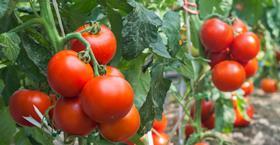
Morocco’s tomato export curbs are hitting UK retailers and leaving gaps on shelves, as the market feels the combined effects of Spain’s haulage strike and lower production by British and Dutch greenhouse producers.
A ‘perfect storm’ of Spanish trucker protests over the price of fuel, reduced plantings in the UK and the Netherlands due to rocketing gas prices, and a Moroccan export ban to lower domestic prices is creating a European tomato shortage, according to suppliers.
Morocco slapped curbs on its round tomato exports this month after soaring prices led to domestic protests ahead of Ramadan.
The impact is being now felt across UK supermarkets, according to Alex Margerison-Smith, marketing & insights manager for Keelings International – a major tomato supplier to UK retailers.
“We are seeing gaps on the shelves in retailers,” he told FPJ. “Over recent years UK retailers have increased the amount imported from Morocco.
“What is also compounding the situation, is the haulage strike in Spain. Lorry drivers are striking and preventing lorries from leaving due to the cost of fuel.”
Morocco restricted exports of its Europe-bound round tomatoes to ease a pre-Ramadan surge in local prices for a key component of the nation’s cuisine and fast-breaking meals.
According to press reports, Morocco’s sends some 430,000 tonnes of tomatoes to Europe each year, making it the region's largest outside supplier. Unprecedented demand from Europe due to fall in production has caused the price of one of Morocco’s cheapest fresh staple foods to soar over the past few weeks, and inflation has stoked domestic protests ahead of Ramadan which starts on 2 April.
Cherry tomatoes are not covered by these latest export restrictions, Fatiha Charrat, commercial and marketing director for leading grower-supplier Delassus, told Fruitnet.
“The round tomato is the basis of the Harira, the Moroccan soup that people consume during Ramadan.This means that a lack of tomatoes during this period is devastating for the consumer,” she explained.
“However this [pre-Ramadan tomato export restriction] is not a usual situation. Normally at this time of the year prices are stable because the availability in Europe is correct. Dutch tomatoes starts getting to markets as well as French and other local production in Europe and UK. However, due to the current high cost of gas, European producers postponed the cultivation creating lack of production in the tomatoes and also peppers and cucumber.
“Prices for these products went up due to limited availability putting pressure on growers from Morocco. This ended up with inflation in domestic market. Government has to react to protect local consumers in a very important period.”
Morocco’s move adds to a raft of crop protectionism worldwide. The war in Ukraine is accelerating food inflation that was already rising, spurring governments to ensure domestic supplies by restricting trade abroad. According to press reports, Argentina is blocking export registrations for soybean meal, while Indonesia tightened control over palm oil sales. Nearby Egypt banned exports of staples like lentils.



